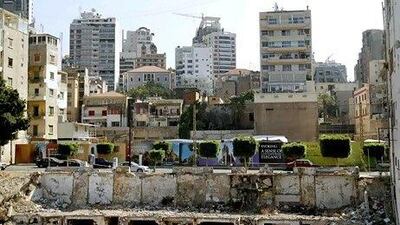The other day I met a taxi driver who told me he was a professional musician in his spare time, the sort one might see accompanying popular singers on Lebanese TV. At one point in our journey he turned up the volume to listen to news reports of fighting in Tripoli before switching off in disgust.
"Things will never change for Lebanon," he said. "In that Zeytouni Bay [in Beirut], people are eating and drinking and having fun, while young Lebanese boys are killing each other in Tripoli."
We drove on in silence for a while. Then he said: "My brother is in Canada. He comes here once a year to kiss his mother, show his family Lebanon, eat some good food and then he go home to his job. We have become a country for our men to visit. What does that say about us who remain?"
I gave my usual response about living in the West not being all it is cracked up to be, but he just got more agitated. "Yes, but over there … there is a system. There are opportunities. Here there is nothing but crime and dirty politicians."
I remembered his words when I heard the glamorous Republican businesswoman Lady Lynn Forester de Rothschild talk on Sky News about the British private sector's obligation to create jobs, what she described as "inclusive capitalism".
Earlier, while speaking in London at the launch of this initiative, she quoted the Harvard economist Lawrence Katz, who famously compared the American economy to a large apartment block in which the penthouse was all fine and dandy but the further down the building you went, the housing got progressively worse. In Mr Katz's apartment block, the elevator - the metaphor for mobility - had broken down. He could have been describing Lebanon.
I am sure that the de Rothschild initiative is in part a bid to restore public confidence in a private sector - banking and finance especially - that has in recent years been defined by greed and fat-cat bonuses and which in part probably contributed to the riots in London and elsewhere last summer.
Again, there are parallels in Lebanon where the business community would do well to listen to her proposals, which include tackling an acute skills shortage, supporting small to medium enterprises and moving away from short-termism.
Like Mr Katz's apartment block (an apt metaphor given that Beirut is today defined by hundreds of new high-rises), the Lebanese economy is also top-heavy. The banks do what they have done for decades and lend to the government but not to small businesses.
The construction sector is in full swing but the jobs it creates are short-term manual labour, mainly for foreign workers. Only the hospitality industry offers any sort of training, but even there, young men and women eventually head off to the Gulf, where salaries are more competitive. Ditto those who work in the media and for regional multinationals.
I suspect my children will also choose to emigrate, despite being born and raised here.
It is a situation to which I am resigned. There are neither the opportunities nor the work environment for this generation, one that wants to embrace a fast-flowing global culture like no other generation before it.
For those who leave school with no meaningful qualifications, fast-food delivery, messenger work or waiting tables beckons. For them, entrepreneurship means opening a mobile-phone-recharge kiosk. No wonder the brotherhood of the militia, with the instant respect that an AK-47 can provide, retains a certain allure.
As the disaffected youths of Tripoli shoot and mortar each other, consider these words from an Australian diplomat with whom I had dinner last month: "You Lebanese are the most gifted people I have ever come across. Imagine if you all came back and lived here. Lebanon would be one of the greatest countries on Earth."
In the meantime, the musicians are driving the taxis.
Michael Karam is associate editor in chief of Executive, a regional business magazine based in Lebanon

